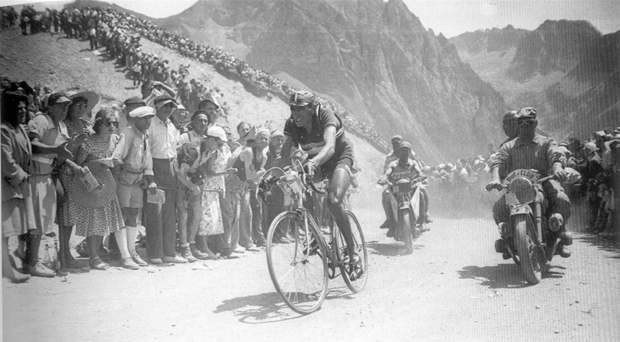

Biago Cavanna
The Man Who "Saw" With His Hands
By Owen Mulholland
Back to bicycle rider histories
Bill & Carol McGann's book The Story of the Giro d'Italia, Vol 1: 1909 - 1970 is available as an audiobook here. For the print and Kindle eBook versions, just click on the Amazon link on the right.
Owen Mulholland writes:
A tall, rather frail looking young amateur cyclist, accompanied by two friends, hesitantly knocked on the door. Moments seemed like minutes before the sound of shuffling feet told them their knock had been heard. The door opened revealing an imposing figure. Weighing at least 250 pounds and wearing darkly tinted, black-framed sunglasses, the man had, at least, a reassuring voice.
"Hello Domenico," he greeted them. "I've been waiting for you and your friends. "Please do come in." Handshakes were made, and the moment he grasped the tall one's hand he exclaimed, "Ah, yes, you must be the young Fausto Coppi about whom we've heard so much of late."
The young men were ushered down a hallway and into a simple room whose main adornment was a massage table. There each undressed so that the renowned "Wizard of Cycling", the "Muscle Magician", might work his magic.
His name was Biago Cavanna and by 1938 he was a legend in cycling circles. Girardengo, Binda, Guerra, all the greats of Italian cycling for two generations, had passed through his hands.
Now he was starting on a third generation. As the three young men prepared to leave, the blind masseur pulled Coppi aside. Fausto almost trembled in his presence. Cavanna spoke seriously now, all trace of warmth gone. The old man had just made a discovery and in his own way was just as excited as the shy youth in front of him.

Fauto Coppi racing in the 1949 Tour de France.
"Listen to me," he intoned. "My hands see more than my eyes. My ears hear what can't be heard. Your lung capacity, heart strength and muscles indicate you can become a great champion. Believe me, I am not mistaken. Will you do as I say?"
Coppi could barely stammer out an, "Of course."
"Then do not race for the next three months."
"But I must race," Fausto replied. "It's how I make my living."
"I am sorry for you," Cavanna sighed. "There is nothing I can do for you. You see, you must build yourself up. Eat meat every day."
Even though he could not understand the master's reasoning, Coppi returned home, determined to follow his advice.
He abandoned the rest of the season and prepared the following spring under the direct "gaze" of the blind man. The rest is, of course, history. Fausto Coppi remains the greatest cyclist Italy has ever produced and for exactly twenty years his superb physique received daily attention from the blind wizard, Biago Cavanna.
Of course, being associated with Coppi did nothing to diminish the remarkable masseur's allure. Coppi never forgot what Cavanna had done for him and wasn't the least bit protective of his services.
In the off-season promising young riders practically stood in line to receive the magician's appraisal. One of the most illustrious was Jacques Anquetil, who, until Bernard Hinault, was the greatest post-WW II French rider. Like Coppi, Anquetil had been a prodigy as an amateur.
Anquetil gave himself the "three race test". He told himself, "If I don't win one of the first three races I enter, then I'll give it up and go back to picking strawberries with my father". If nothing else, the young man was serious about what he did.
Nevertheless, he needn't have worried. He won all three races! He turned professional towards the end of the following season, 1953, and promptly won his first major event in that category, the Grand Prix des Nations.
The rapidity of his development amazed many, including himself. He decided to visit Coppi at his home in Italy. Coppi was king of cycling in 1953 and the young Frenchman wanted a close-up look at the demi-god. Maybe he could glean some secrets from a man who, at 34, still obviously held the keys to top form. And then there was the sorcerer, Biago Cavanna. His "first hand" analysis would surely be interesting.
After the initial greetings and Jacques was stretched on the massage table, Cavanna spoke Italian as he worked. Coppi translated. "You must have a regulated life. Nothing must upset your rhythm. Don't eat too much, and what you do eat should be simple. A little wine is OK, but sans excess. Most importantly, drink mineral water to help your body get rid of toxins. This is the regimen. Don't let any alibi keep you from it."
Anquetil thought, "Coppi has exposed his credo. This is what Cavanna has demanded and I know Coppi follows it to the letter. But is it good for me? Is it indispensable?" He interrogated himself but gave no answer to Coppi.
"I knew," Anquetil wrote later, "I would never become hostage to such regulations. I had my car, nice clothes, money, trips and beautiful hotels to stay in. Had I sacrificed so much not to enjoy champagne? Never!"
Of course Jacques was discreet enough not to voice these reservations and Coppi was so impressed that he invited the young visitor from Normandy to come live with him. But Anquetil knew he had to follow his own path and declined the honor.
I have never found what Cavanna thought of Anquetil's somewhat loose approach to professional discipline. In fact there is little further mention of Cavanna in the various accounts of Coppi's last years. Their stars appear to have faded together.







